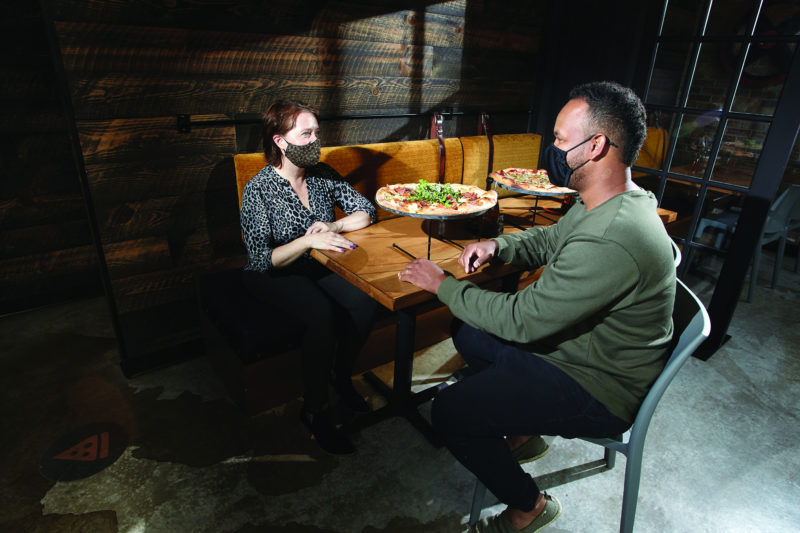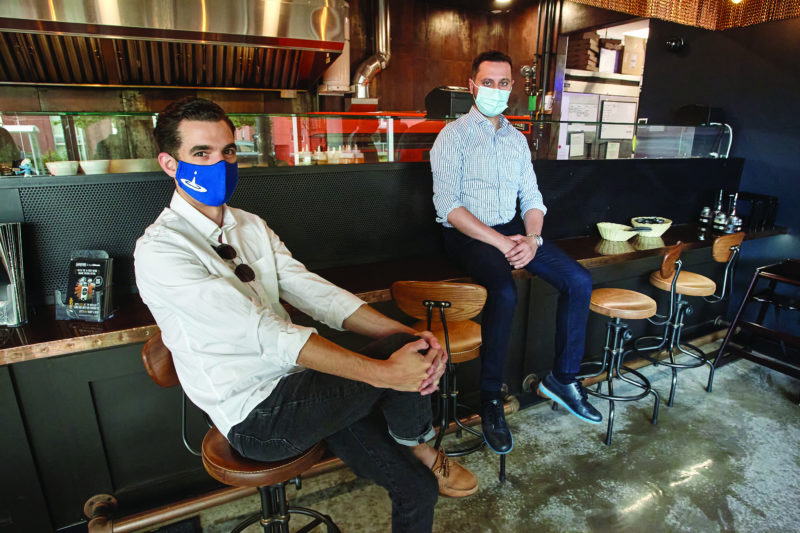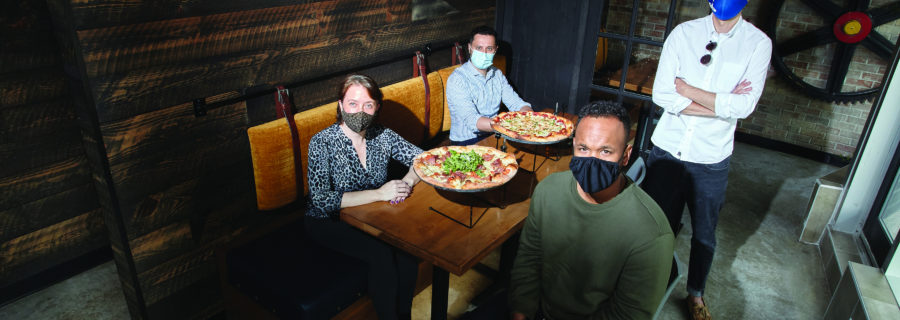The mark of an entrepreneur is someone who is able to work dynamically, anticipating hurdles before they appear and pivoting successfully when taken by surprise. While it could be easy to argue that COVID-19 has presented one of the biggest hurdles to business owners in modern memory, many Halifax entrepreneurs have proven amazingly nimble as they adapt to their respective new realities.
The pandemic has provided the opportunity for four such Halifax entrepreneurs to solidify their current offerings and even expand into others. If one really examines the situation closely, thinking of how an entrepreneurial mind works, it’s clear this really is a perfect time for creativity and invention — driving innovators like Ryan Williams, Melanie Little, Moe Alhaj and Joel Muise forward on their journeys.

ENTREPRENEURIAL EXPANSION
“I’m an entrepreneur and I’m getting to help other entrepreneurs improve their creative strategy and online presence, which will, in turn, attract them more customers. I don’t think there’s a better business I could be in right now,” says Williams.
Williams went into COVID-19 with plenty of work at both of his companies, Ryan Williams Photography and Atlantic Live Stream. But as the events he was hired to capture were cancelled one by one, he decided to hit pause, take some time for his own professional development and refine his existing skillset, while learning new skills to add to his toolbox. “Once I realized the scale of COVID-19 and the impact it would have on my business, I realized right away I needed to pivot. I got certified to be a drone operator just a few weeks into the pandemic and also started honing my editing skills for video. I wanted to come out of this period with something to show,” he says.
Williams had begun shooting video over the last year and partnered with a friend on producing a video for Doctors Nova Scotia, which thanked people for supporting one another while following health guidelines during the pandemic. When the video got more than 200,000 views in 10 days, Williams saw how this was the perfect time to start his newest company, Unbound Media, which will create photo, video and creative strategy content for his clients and their brands.
Williams says his video going viral made him realize that content creation wasn’t going anywhere, as many people were wanting to get their brand online more than ever as the pandemic gave them time to pause, review their work and leave their nine-to-five jobs in favour of focusing on their own ventures.
“I had always had an idea to start a media company focused on branding and this kicked it into high gear,” he says. With his mindset focusing on coming out of the pandemic stronger than how he went into it, Williams’ work on expanding his offerings is something he suspects others have done as well. “Entrepreneurship is all about resiliency, pushing forward no matter what and adjusting when needed as you find ways to make it work ...,” he says.
PROFIT NOT THE ONLY PRIORITY
Adjustments of a different kind were made by Little at vlife, an online platform she co-founded with Riaz Khan. The platform — full name vlife by Quantum Link — features small, independent businesses in a virtual storefront (or v-store) that drives traffic to each business’ website, all to encourage supporting local. Their platform is run as a social enterprise with a triple bottom line: people, planet, then profit.
After launching in December 2019, vlife first offered its providers a free trial with the intent to move into a paid service in March. But when COVID-19 turned the world upside down, Little and Khan pivoted, deciding to delay revenue until the end of June and then re-evaluate. The platform has now transitioned to a paid service, costing $30 per month, but will continue offering free services to their providers still recovering from COVID-19 losses before transitioning them to paid later.
“The pandemic has allowed us our first big opportunity to live our values, which are in the order of people, planet, then profit. It’s one thing to say you’re a social enterprise and another to live it. In a way, this is delayed revenue and is not ideal from a business point of view, but we don’t look at things from just a profit point of view,” says Little.
Despite the pandemic, vlife has expanded its client base earlier than anticipated and now promotes small businesses within the Halifax Regional Municipality and across Atlantic Canada. Little says she has been impressed by how quickly small, independent businesses have adapted to their customers’ needs and feels grateful for the opportunity to work closely with them to keep followers aware of their offerings during these challenging times. “We’re seeing a real resurgence of people’s interest in bolstering their local supply chain — and online is key to that,” says Little.

ADAPTING TO CHANGE
Alhaj, Founder of G-Street Pizza, says dine-out at his Gottingen Street restaurant became a no-go when COVID-19 descended in March, but the installation of new custom French-door-style partitions between tables has seen traffic increase over the summer. He says takeout orders of pizza and other menu items also decreased but are now relatively steady. And the restaurant pivoted to offer a new menu item during the pandemic: a make-your-own-pizza kit for customers to build and bake their own pizzas at home.
“The box has the pizza dough, toppings, cheese and sauce, along with directions on how to spread the dough, what to add, what temperature to cook it at and for how long. We launched this in March, when people were stuck at home, as an enjoyable thing to do with your partner or family while still enjoying pizza,” says Alhaj.
The ever-evolving health regulations have been no problem for the business, which has always prioritized hygiene with strong precautions in place, like wearing gloves while handling food and frequent cleaning of all surface areas. Precautions have been added, like masks for all staff and customers and barriers between tables. Employees also have their temperatures taken each shift.
Alhaj says he feels such precautions will likely continue being necessary until at least next year or until a vaccine or other solution to COVID-19 is discovered. “We always prepare for the worst and will be sticking with all procedures and exercising caution. We won’t ease up, even if case numbers are low, because you never know,” he says.
TEAM APPROACH
It was Muise’s own personal dilemma that first inspired him to start his own company when his anxiety and depression were exacerbated by his career as a stock analyst. “I had trouble finding help within the system, but eventually found something online that was helpful. I wrote a blog about it that later went viral and that was a signal that there was a lot more here that needed exploring,” he says.
Muise is the Co-Founder and CEO of Tranquility, an anxiety therapy app that provides affordable, individualized virtual cognitive behavioural therapy to users on their smartphones or laptops as paraprofessional clinical psychologists (called coaches on the app) monitor their progress. Tranquility has grown
to include six full-time staff, including Muise and Co-Founder Dr. Alissa Pencer, three contracted staff and seven coaches, who Pencer recruited from Dalhousie University’s clinical psychology and psychiatry department, where she is a senior instructor.
Muise says despite having just closed a round of funding in January and hiring three new staff just before COVID-19
hit, the team transitioned easily into working from home. Their challenge, according to Muise, was in accommodating an increasing number of new users, including health-care workers for whom the app was made free to access during the pandemic.
“It all happened overnight and we had to go from zero to 60 really quick. As hard as it was, I think long-term it was helpful for us as a team to go through this. We’ve come out of it stronger,” he says. Muise says research has confirmed the virtual delivery of the app is proving to be not only extremely cost-effective and accessible to users, but also comparatively successful to person-to-person sessions. The app continues to see success and is even coming out with a depression program in a few months.
IN IT TOGETHER
As Muise and his colleagues work to ready the app for its new users who are keen to sign up, they and their counterparts, Williams, Little and Alhaj, prove that another marker of being an entrepreneur is working hard at your business, while bringing others up alongside you. “Our mentality is that a rising tide raises all ships. If we work at this together, it could mean we aren’t hit as this happens again,” says Little.
< Back to Articles | Topics: Cover story

